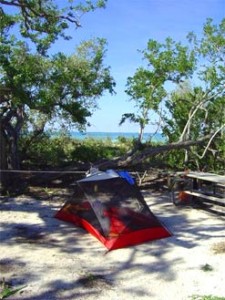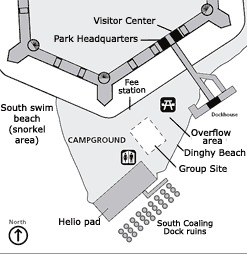Information for camping in Dry Tortugas National Park, including campsite map, regulations, and advice.

Are you looking for a memorable camping experience? Do you enjoy relaxing sunsets and breathtaking nighttime skies? Camping in Dry Tortugas National Park offers that and much more.
Keep in mind that space and services are limited. All overnight camping must take place within the Garden Key campground which is located just south of Fort Jefferson. The eight regular campsites are available on a first-come first-served basis. Should a regular campsite not be available, an overflow area is available.
Camping Update: Now that there is only one ferry service available to transport campers to the Dry Tortugas, camping capacity has become extremely limited. Only 10 campers can be transported to or from the Dry Tortugas on a given day. (previously there were 12 spots available per day). As a result, we suggest you book well in advance.
Availability Update: Currently, camping in the Dry Tortugas is sold out weeks in advance. Contact the National Park Service for more information.
Things to know about Dry Tortugas camping:
-

This Dry Tortugas camping map shows the campground location on Garden Key. Be prepared for your visit.
This is a primitive camping experience. Campers must provide all of their basic needs, including food, water, shelter, medication, and other essentials. Composting toilets are available, but all trash and garbage must be packed out. There are no showers. - Space is limited
Each of the regular campsites contains a table and grill. Three tents and six campers are the maximum allowed per campsite. All tents must remain within ten feet of your table. Be prepared to share the limited campground area with others, and remember that flexibility is the key to a successful experience. - Do not attach anything to a tree
Campground trees and shrubs are crucial for providing shade and protection from the wind. Help protect this valuable vegetation. Do not attach ropes, hammocks, tents, laundry lines, or any other materials to campground trees. All camping gear must be free standing. - Wood fires are prohibited
Gas camping stoves or charcoal briquettes placed in campsite BBQ units are the only fires allowed. - Important: Clear you campsite by 10:00 a.m..
On the day of departure, completely clear you campsite. Carts are available to move your gear, but empty your cart as soon as you reach the dock. As soon as the ferryboats off-load arriving passengers and equipment, load your gear on board. - Finding a Campsite:
If a ranger is unavailable to assign you a site, look for a table with a stenciled number. Only those tables with numbers are assigned to campsites. Should you find all eight regular sites occupied, you must share the overflow area with other campers. - The Overflow Area:
The Overflow Area is a grassy area located near the regular campsites (see map to the right). Tables and grills are provided, but they must be shared with other overflow campers. Note: as campers leave, you may move to a regular site if one becomes available. - The Group Site:
The Group Site is located between the regular sites and the Overflow Area. The Group Site is normally available only for groups of 10-40 campers, and must be reserved in advance. The site contains grills and two tables, and is large enough for 12-15 tents. Call Key West Travel Guide toll-free at 877-INFO-KEY for reservations. Groups of 10 or more campers arriving without a reservation will not receive exclusive use of the Group Site. - Group Site as Overflow:
During periods of heavy use, the Group Site may be used for an overflow area, but only on unreserved nights. Any unreserved group choosing to camp in the Group Site during overflow periods must relocate to the Overflow Site by 10:00 a.m. on the day the site is reserved. For more information refer to the Reservation Board located in the Group Site. - Fees:
The Garden Key campground is a self-service fee area with a nightly fee of $15 per campsite.
On the day of arrival, campers must obtain a payment envelope at the self-service fee station. Fill out the envelope, deposit it in the fee station collection post, and keep the stub at your campsite for ranger inspection. There is no change provided. Please make sure to bring the amount required. Note: fees paid for transportation (ferry or seaplane) do not include camping fees. - Toilets:
Toilets are located next to the campground. These specially designed composting units require no water or chemicals. Waste is composted in the equipment below the units. Since these systems are very fragile, please DO NOT throw cigarettes, plastics, bottles, cans, or trash of any kind into these toilets. The composting toilets are locked from 10:00 a.m. to 3:00 p.m. During these hours, please use the facilities on board the commercial ferry boats at the dock. - Kayaks and Other Craft:
Campers who bring boats of any kind must keep them out of the designated swim area. Feel free to keep boats in your site, but only launch them at the designated dinghy beach that is located near the Group and Overflow sites. Remember to wear a life jacket at all times while boating. - Quiet Hours:
Please be considerate of others. Radios and other loud noises are precisely what many visitors have come to the Dry Tortugas to escape. Please observe the quiet hours from 10:00 p.m. to 6:00 a.m. The use of bright lanterns is also discouraged during these hours. - Access to Fort Jefferson:
One of the great pleasures of any visit to the Dry Tortugas National Park is the opportunity to explore Fort Jefferson. Be aware that many areas inside the fort are not lighted. To avoid the risk of injury, the interior of Fort Jefferson closes at sunset.
For reservations and information:
- call us toll-free at 877-INFO KEY (877-463-6539)
- or click here to ask a question
